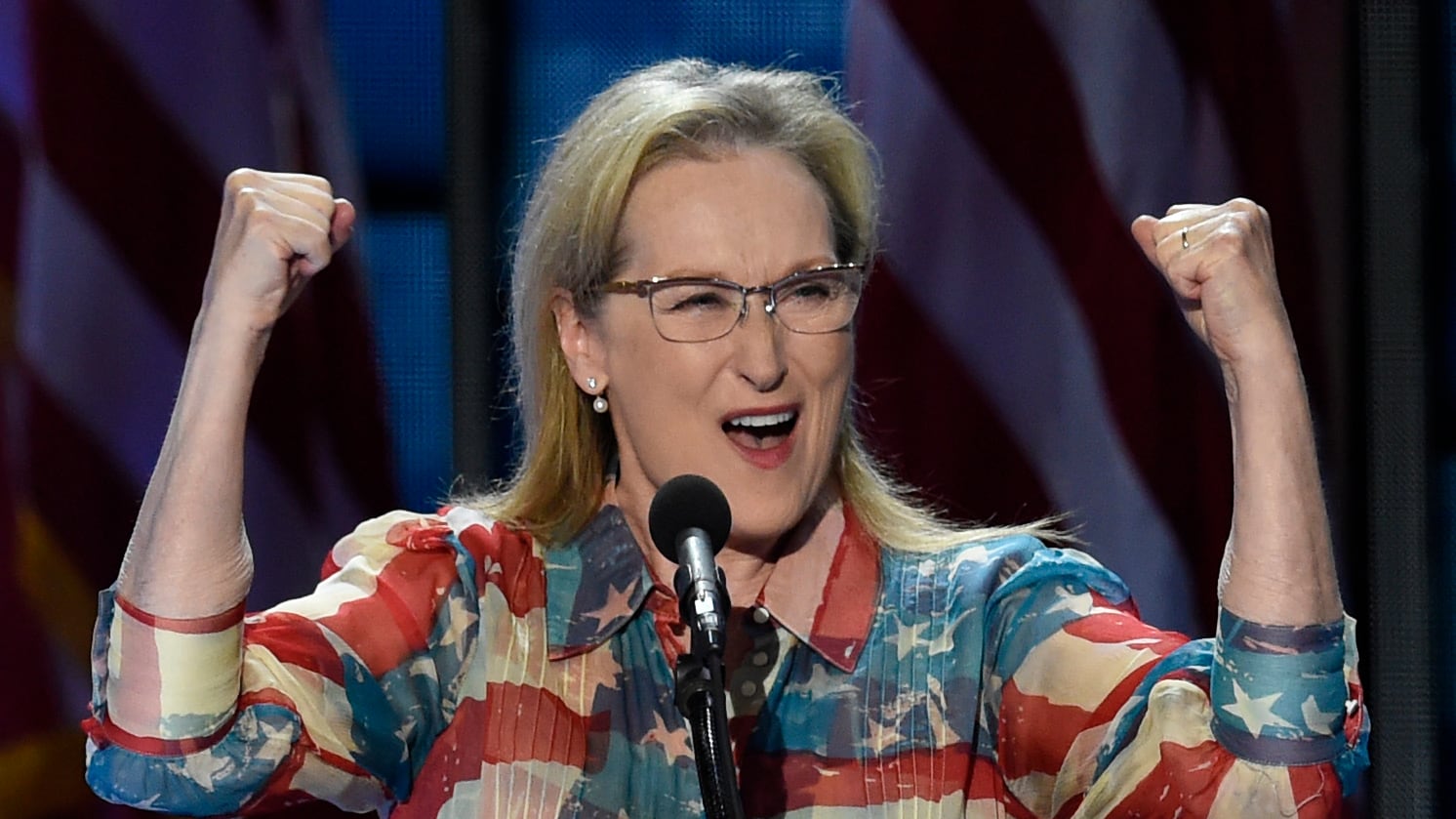With a celebratory banshee whoop and the patriotic fashion equivalent of that same noise—a star-spangled wrap dress that set Twitter alight with comparisons to your favorite aunt on Memorial Day (and which Streep has worn before)—only Meryl Streep could follow the epic episode of How I Met Your Mother that was Bill Clinton’s transfixing, illuminating homage to his wife.
“We got some fight left in us, don’t we?” she rousingly asked the crowd, clearly somehow immune from the soul-crushing “Fight Song” viral video featuring a star-stuffed lineup (Jane Fonda, Kathy Najimy, Ellen Greene, Kristin Chenoweth) that I accidentally dream-cast in a gay fever dream.
The truth is, though, that nothing, not even that godforsaken song could curb excitement for a Meryl Streep speech. Many a wine-fueled YouTube rabbit hole has made me an academic expert of sorts on the Streep Speech and, with the exception of a Michelle Obama or a Bill Clinton, they are unrivaled.
More, during a celebrity orgy that has one wondering if the entire film industry has shut down for the week, Streep brings with her the gravitas that the occasion of the first woman to officially receive a major party nomination for president in U.S. history deserves.
Streep recognized the occasion, too. And my god did she rise to it.
“What does it take to be the first female anything?” she asked, setting up the theme of her speech. “It takes grit, and it takes grace.”
It’s a line that should resonate deeply with Hillary Clinton supporters, particularly women who have made some of the cracks in the glass ceiling that finally broke Tuesday night. If Bill Clinton’s speech colored the evening with a meandering, awakening reintroduction to Hillary Clinton’s lifelong work and service—many of the stories heard for the first time—it’s Streep who summed up its importance and its legacy, which is still to be written, in a catchphrase.
She compared Clinton’s grit to Deborah Sampson, the first woman to take a bullet for the country as a member of George Washington’s Continental Army, an army with which she disguised herself as a man to fight alongside. When she was shot she removed the musket ball and stitched up her wound herself, Streep recounted, so that her ruse wouldn’t be found out by a doctor and she could keep defending a document—the Constitution—that, because she was a woman, did not defend her.
“That’s grit,” Streep said. “And grace?” That’s when the direct Clinton comparisons started.
Streep’s words only alluded to the decades of sexist treatment, underestimation, dismissal, and misogynistic attacks Clinton had received in her decades in the public eye, but, ever the performer, the frustration radiated from her voice and her expression.
“Hillary Clinton has taken some fire over 40 years of her fight for families and children,” the Oscar-winner said. “How does she do it? That’s what I want to know. Where does she get her grit and her grace? Where do any of our female firsts, our pathbreakers, where do they find that strength?”
To growing applause, Streep then listed off those “female firsts” trailblazers—Sandra Day O’Connor, Shirley Chisholm, Harriet Tubman, Sally Ride, Madeline Albright, Eleanor Roosevelt, and many more—a list that Hillary Clinton now joins and, should she win in November, perhaps even be on top of.
It’s almost redundant to describe a Meryl Streep speech and say that the actress had the audience rapt, ready to whoop along to every bravura celebration of Clinton’s accomplishments that punctuated her sentences and nod along to her rudimentary women’s history lesson. But while certainly no Scott Baio—who, would you believe, was the veritable Meryl Streep of the Republican National Convention—Streep wasn’t exactly a no-brainer to champion the evening’s momentous celebration.
Streep has, in recent years, found herself mired in controversy when it comes to feminist issues. There was the “I’d rather be a rebel than a slave” T-shirt she wore along with the cast of Suffragette at a press event, and her remark to an interview that she was “a humanist, I’m for a nice easy balance” when asked if she was a feminist.
There was her “we’re all Africans” misstep at the Berlin Film Festival—which she says was taken out of context—when asked about serving on an all-white judging panel. That’s not to mention her Oscar-winning performance as Margaret Thatcher, another “female first,” which was too humanizing or exceedingly unflattering, depending on which side of the British aisle you asked.
Despite all of that, one would be a fool to question Streep’s fierce and vocal commitment to female power, equality, and equity throughout her entire career. This is, as The Daily Beast has even called her, “The Greatest Feminist Actress.” And one would certainly never be able to deny the electricity of having such an icon and orator speak on such a historical night.
“Tonight, more than 200 years after Deborah Sampson fought, and almost 100 years after women got the vote, you people have made history,” Streep concluded, as convention-goers’ eyes began to well up with tears.
“And you’re going to make history again in November, because Hillary Clinton will be our first woman president. And she will be a great president. And she will be the first in a long line of women—and men—who serve with grit and grace. She’ll be the first, but she won’t be the last.”






